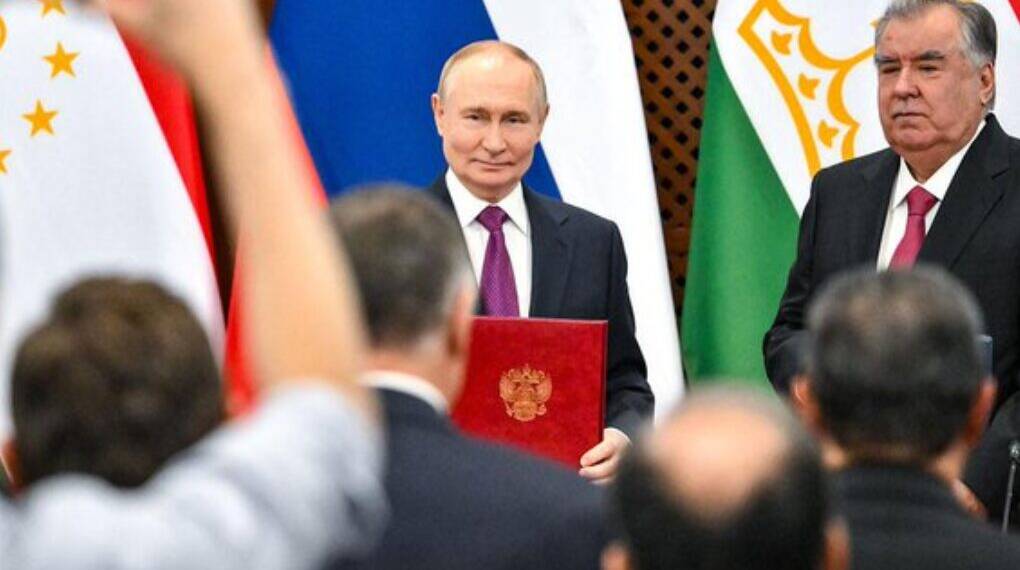In a move that has reignited tensions between Europe and Russia’s allies, the European Union has accused Tajikistan of failing to uphold its obligations under international law after it hosted Russian President Vladimir Putin during the CIS Heads of State Council meeting in Dushanbe on October 9–10.
According to the European External Action Service (EEAS), Tajikistan — being a signatory to the Rome Statute, which established the International Criminal Court (ICC) — was legally bound to execute the arrest warrant issued against Putin. The ICC has charged the Russian president with war crimes, particularly over the alleged unlawful deportation of Ukrainian children from occupied territories, a case that has sparked international outrage since early 2023.
However, Dushanbe, like many post-Soviet states that maintain close ties with Moscow, chose not to act on the ICC warrant. Putin’s participation in the summit, without any attempt by the Tajik authorities to detain him, has prompted sharp criticism from the EU, which accused Tajikistan of undermining the credibility of international justice and breaching its treaty commitments.
EU’s Firm Response: A Warning to ICC Signatories
In its official statement, the European Union reminded all ICC member states that they are legally obligated to cooperate with the court, regardless of political alliances or bilateral pressures. The EEAS emphasized that international law must be applied consistently, warning that selective compliance weakens the global rule of law and emboldens those who commit atrocities.
Brussels’ rebuke of Tajikistan is seen as part of a broader effort by the EU to reinforce accountability mechanisms amid growing concerns that several ICC member nations — particularly in Asia, Africa, and Latin America — are reluctant to enforce the court’s warrants against powerful leaders.
An EU diplomat noted that Tajikistan’s move “sends the wrong signal at a time when the world needs to strengthen, not weaken, international justice.”
Tajikistan’s Dilemma: Between Law and Loyalty
For Tajikistan, the situation is far from simple. As a former Soviet republic, it remains economically and militarily dependent on Russia, which maintains a significant military presence on Tajik soil through its 201st Motor Rifle Division — Moscow’s largest base outside its borders.
Putin’s visit to Dushanbe for the Commonwealth of Independent States (CIS) summit was part of a broader diplomatic outreach aimed at solidifying Russia’s influence in Central Asia amid Western isolation. The Tajik government, led by President Emomali Rahmon, has long relied on Moscow for economic aid, security cooperation, and labor migration support — factors that make it politically impossible for Dushanbe to challenge the Kremlin.
Analysts suggest that arresting Putin would have been seen by Moscow as a betrayal of alliance, potentially triggering economic retaliation or military pressure. Tajikistan’s muted response to the EU criticism thus reflects its attempt to balance international legal obligations with geopolitical survival.
ICC’s Dilemma Deepens
The ICC’s arrest warrant for Putin has become a litmus test for the court’s authority. While the warrant has symbolic weight, enforcing it has proven extremely difficult, as it depends on member states to act. So far, Putin has visited several ICC signatories, including South Africa (virtually) and Tajikistan (in person), without any consequence.
This non-compliance not only raises questions about the ICC’s enforcement mechanisms but also highlights the power imbalance in international law — where smaller states risk severe repercussions for compliance, while great powers often enjoy impunity.
The Tajik case has further exposed this weakness. Although the ICC has no police force of its own, its legitimacy relies on the willingness of states to uphold justice even against influential leaders. Tajikistan’s inaction, therefore, is not merely a legal oversight but a political signal of deference to Russia and defiance of Western-led norms.
Broader Implications for Central Asia
Putin’s free movement within the region underscores Russia’s continued dominance in Central Asia, even as Western nations seek to expand their presence through economic and diplomatic engagement. The EU and the U.S. have both been attempting to woo Central Asian states with promises of investment and infrastructure support under the Global Gateway Initiative and C5+1 format, but Moscow’s historical ties remain deeply entrenched.
Tajikistan’s defiance may also embolden other ICC member states in the region to ignore international rulings that conflict with their strategic interests. It serves as a reminder that international law often bends under geopolitical weight, especially in regions where Western influence is limited.
A Clash Between Justice and Geopolitics
The European Union’s condemnation of Tajikistan for failing to comply with the ICC’s arrest warrant on Vladimir Putin underscores the tension between legal principles and realpolitik. While Brussels champions the universality of international justice, nations like Tajikistan face the harsh reality of choosing between legal compliance and political survival.
As long as the ICC lacks an enforcement mechanism independent of state cooperation, its authority will remain vulnerable to geopolitical realities. For now, Putin’s visit to Dushanbe serves as yet another reminder that in today’s fractured world order, power often shields those accused of crimes, while justice remains hostage to politics.








